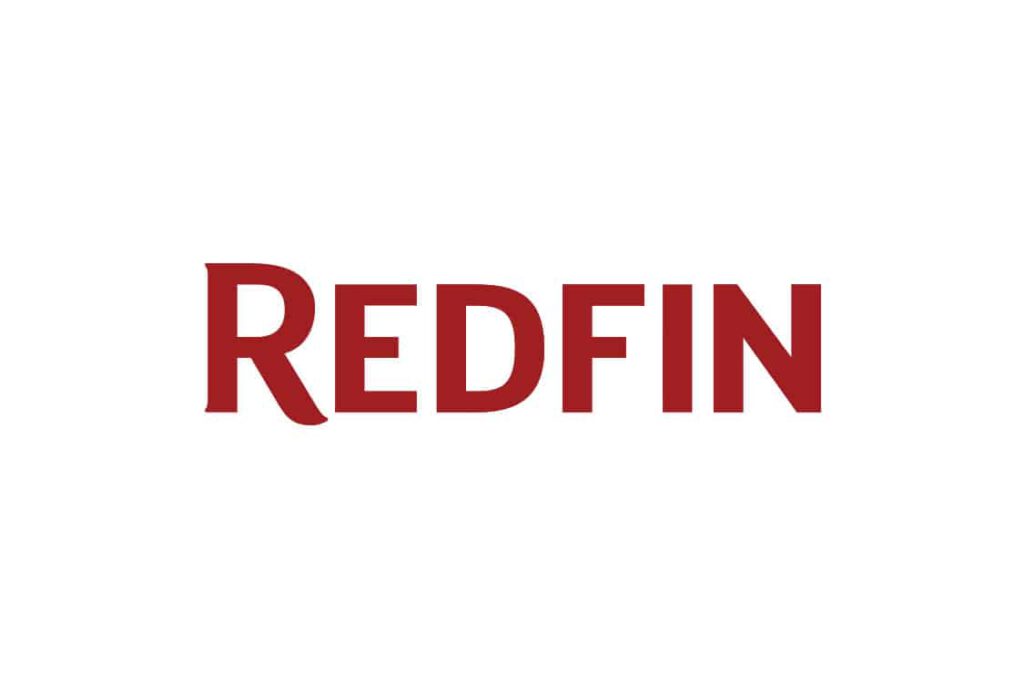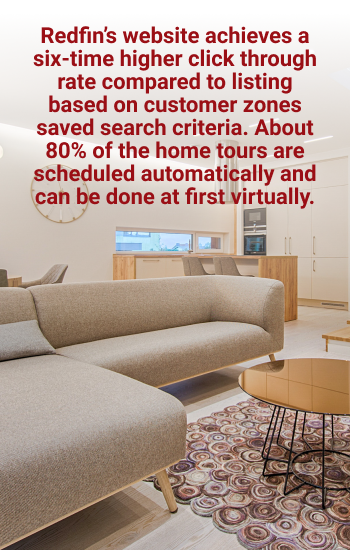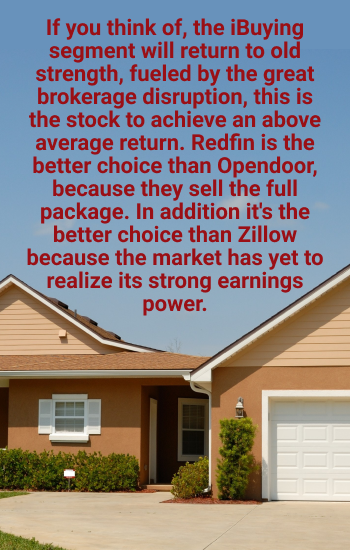The Search
Your Search Results
News from us
Newest Symbols
Newest Industries
Click to expand
Advertising
See Stocks
Automotive
See Stocks
E-Commerce
See Stocks
E-Learning
See Stocks
Electricity
See Stocks
Engineering
See Stocks

FlexShopper Inc.
Bullish
Bullish

Tattooed Chef Inc.
Neutral
Neutral

Hellofresh SE
Bullish
Bullish

Build-a-Bear Workshop Inc.
Outperform
Outperform

Stamps.com Inc.
Bullish
Bullish

Redfin Corporation
Bullish
Bullish

Perion Network Ltd.
Outperform
Outperform

Upwork Inc.
Bullish
Bullish

Chegg Inc.
Bullish
Bullish

Pinterest Inc.
Bullish
Bullish

Bluelinx Holdings Inc
Bullish
Bullish

Momentus Inc.
Neutral
Neutral

Mynaric AG
Neutral
Neutral

Virgin Galactic Holdings Inc.
Neutral
Neutral

Maxar Technologies Inc.
Neutral
Neutral

Sunrun Inc.
Bullish
Bullish

Steico SE
Neutral
Neutral

Alfen N.V.
Neutral
Neutral
Research
Content Cards
Swipe
Our Article
Redfin Corporation - Article
Research: Redfin – Disrupting the Consumer Real Estate Market

Table of Content:
-
- Introduction
- What sets REDFIN apart from the traditional way of buying and selling?
- Recent News and Updates
- Share Structure
- Chart
- Management
- Financials
- Competition & Risks
- Valuation
- Conclusion
Reality is that in the last years everything we can buy and sell has moved online except real estate. But especially this is a category that touches everyone. 68% of Americans are Homeowners, 5M homes are sold every year – it is the largest undisrupted market worth 1,6T$ annually. Despite that it is completely fragmented plus processes are inconvenient and expensive. Redfin intends to disrupt that.
Let the company introduce itself
“Redfin is a technology-powered residential real estate company, redefining real estate in the consumer’s favor in a commission-driven industry. We do this by integrating every step of the home buying and selling process and pairing our own agents with our own technology, creating a service that is faster, better and costs less. We offer brokerage, iBuying, mortgage, and title services, and we also run the country’s #1 real estate brokerage search site, offering a host of online tools to consumers, including the Redfin Estimate. We represent people buying and selling homes in over 90 markets in the United States and Canada. Since our launch in 2006, we have saved our customers over $800 million and we’ve helped them buy or sell more than 235,000 homes worth more than $115 billion.”
Source: Redfin
What sets REDFIN apart from the traditional way of buying and selling?
Superior value proposition
An appointed Redfin agent, that is acquainted in the particular area the buyer is looking for a house, supports the customer in every step of the way. From the neighborhood to the street, the Redfin platform always tries to accommodate the agent in taking decisions for the buyer. It is even possible to get a complete virtual house tour. There is no hassle with connecting to a bank and applying for a loan with them, this process is fully automated with Redfin Mortgage & Title. The closing of a deal can be long and stressful but Redfin cuts the time dramatically. All those services, that normally come at an extra cost, are way cheaper than the regular 3% fee. Redfin only takes 1,5%.
Unhinged from the industry average
On average 76,6% of the listings are closed within 90 days, compared to the industry average of 75,1%. This time disparity can immediately be converted into a material advantage. Approximately $1,900 is the average difference between the sale and list prices of Redfin listings versus that of comparable listings by other brokerages. This leads to Redfin selling homes faster and for more money – so there is no reason to sell the traditional way.
Diverse set of products
Next to the already mentioned Brokerage way of buying and selling houses, Redfin offers their Concierge service and even the full package as RedfinNow (iBuying). The Concierge service deals with fixing up the customers house to achieve a higher selling price. Redfin ups their commission to 2,5% for this deal.
iBuying is the easiest way to selling a house because it is outright bought by Redfin. This extreme convenience comes with a price tag of a 7% service fee.
Cutting out the Middleman
Redfin has started out as a brokerage platform with agents, but their new offer, Redfin Direct, intends to eliminate the agent. It allows buyers to make an Redfin listing on their own. Buyers use the step by step online platform to put together an offer on their own, they are in charge to negotiate with the seller and finalize the deal. Every stage is supported by the Redfin platform.
Redfin Direct Access lets buyers unlock the door with their phone and tour properties on their own schedule, without an agent. This feature is available from the front door by tapping to unlock on your phone. That allows better planning because no scheduling is needed with another person.
These above mentioned initatives show how they will act in the future.
Technology-Driven Results
After a listing appears on the American real estate portal MLS (“MLS = Multiple Listing Service”), more than 90% of the offerings will appear on Redfin. The machine learning generated listing recommendation on Redfin’s website achieves a six-time higher click through rate compared to listing based on customer zones saved search criteria. About 80% of the home tours are scheduled automatically and can be done at first virtually.
Customer & Agent loyalty
Redfin has a higher repeat rate on their services than other brokerages. 59% of the Buyers are using Redfin as well to sell the home they have bought. This is supported by the deal that offers the customers to only pay a low 1% listing fee when they also buy with Redfin within the next 12 months.
For agents, Redfin offers about double of the median agent pay. On average Redfin agents close more than three times as many deals plus they are way more likely to stay with Redfin than the typical brokerage.
This adds up to the best benefits for both the customers and the employees and gives Redfin a great moat within their business segment.
Virtuous circle of iBuying
More Sales and more purchases enable a larger geographical footprint which opens up getting cheaper capital and scale on the value added services (e.g. their Renovation services). Passed-on savings boost demand and increase offers.
Recent News and Updates
Third Quarter Highlights
- Reached market share of 1.04% of U.S. existing home sales by value in the third quarter of 2020, an increase of .08 percentage points from the third quarter of 2019.(1)
- Saved homebuyers and sellers over $61 million in the third quarter of 2020. This includes the savings Redfin offers buyers through the Redfin Refund and sellers through Redfin’s lower listing fee when compared to a 2.5% listing commission.
- Grew visitors to their website and mobile application by 38% compared to the third quarter of 2019.
- Kicked off a massive hiring effort to meet surging consumer demand and welcomed over 400 new employees to Redfin in the third quarter.
- Conducted nearly 21,000 video tours. Even as the majority of Redfin consumers have resumed in-person touring, approximately 9% of third quarter tour requests were for video tours, a sign Redfin’s virtual brokerage capabilities will be a long-term competitive advantage even after the pandemic subsides.
- Launched RedfinNow in Palm Springs. The company has now resumed RedfinNow offers in 11 of 13 markets and has continued to expand to additional markets in the fourth quarter.
- Created a new Home Sale Advisor role to better help customers navigate their home selling options at Redfin, whether they choose to list on the market with a local Redfin agent or sell directly to RedfinNow.
- Appointed Kerry D. Chandler, an experienced HR executive, to the Redfin Board of Directors.
Source: Redfin Press Release
Home prices continue to trek up through mid-October
- Since the four-week period ending July 5, home prices have increased 6.8%. Over that same period in 2018 and 2019, prices declined an average of 4.4%.
- The median asking price of new listings was up 14.2% from a year earlier.
- Pending home sales climbed 32% year over year even as the number of sales continued a typical seasonal decline.
- New listings of homes for sale were up 8% from a year earlier.
- Active listings (the number of homes listed for sale at any point during the period) fell 29% from 2019 to a new all-time low.
- 2% of homes that went under contract had an accepted offer within the first two weeks on the market. This measure typically peaks in April or May and declines through the end of the year, but this year it has held steady since late June.
- The average sale-to-list price ratio, which measures how close homes are selling to their asking prices, rose to 99.5%—an all-time high and 1.4 percentage points higher than a year earlier.
- For the week ending October 18, the seasonally adjusted Redfin Homebuyer Demand Index was up 42% from pre-pandemic levels in January and February.
- Mortgage applications decreased 2% week over week (seasonally adjusted) and were up 26% from a year earlier (unadjusted) during the week ending October 16. For the week ending October 22, 30-year mortgage rates were down just slightly to 2.80%. Rates have been below 3% since late July.
Source: Redfin Press Release
Share Structure
Only the CEO holds a mentionable amount of stock (1,8%).
Chart
Management
Glenn Kelman has served as President and Chief Executive Officer and as a member of our board of directors since March 2006 after serving in a number of executive-level roles since 2005. Before joining us, Mr. Kelman was the co-founder of Plumtree Software, Inc., a provider of enterprise portal software products, where he served as Vice President of Marketing and Product Management from 1997 to 2004.
Scott Nagel (President of Real Estate Operations) leads real estate operations at Redfin, with responsibility for brokerage and partner revenue, recruiting, and training, and is President of Title Forward, a Redfin owned title company. Prior to Redfin, he was a managing director at LexisNexis, with profit-and-loss responsibility for an $80 million-business. Prior to that, Scott served as vice president of strategy and client operations at Applied Discovery, a successful legal services software start-up.
Chris Nielsen has served as our Chief Financial Officer since June 2013. Before joining us, Mr. Nielsen served as Chief Financial Officer and Chief Operating Officer at Zappos.com, an online shoe and clothing subsidiary of Amazon.com, Inc., from 2010 to June 2013. Prior to that, Mr. Nielsen served as Vice President, Home & Garden, and in various finance roles, at Amazon.com, Inc., an electronic commerce and cloud computing company, from 2003 to 2010.
Source: Redfin Investor Relations
Consumer Real Estate Market Trend
- Interest rates are far more vital for everyday life than one might think. Rates will stay near ZERO for a long time which makes mortgages extremely cheap and makes inflation pay of a good part of the debt.
- American tax situation of changing deduct ability of state and local taxation, as well as increasing state taxes (California) makes people want to move to low tax states.
- Every market evolves to a digitalized one because that is the native environment of 75M millennials. Especially millennials are starting to enter the housing market, and they will arrive at platforms like Redfin or Zillow.
- Coming out of the global financial crisis housing supply is completely under build which creates large affordability issues in big cities and people are moving.
- The remote working trend increases the urban sprawl because expensive proximity to the workplace is not worth giving up quality of life.
Moving trends take all of these points and solidify themselves in the shift from living in the huge population states like California, New York or New Jersey to the upcoming, younger and dynamic cities in the south. States like Texas, Florida, Georgia and Arizona profit the most.
Financials
Revenue is split in two segments. Services consist of the Brokerage Services and Mortgage & Title (this will be one segment in future). Product revenue shows the iBuying business.
The great thing with not having all the eggs in one basket is that costumers that want to use RedfinNow, but did not want to accept the instant offer, can be converted to the higher margin brokerage services. With the reduction of the iBuying business, revenue has shrunk, so comparing the company now with itself pre-pandemic is flawed.
Redfin was close to gross-profitability with its iBuying business in Q1. The long term goal is a 5% gross margin for their product revenue. Efforts have stopped completely in the first months of the pandemic, so it will take until 2021 for it to reach pre-pandemic levels. But even in Q3 Product gross margin only was -7% (inventory of 19 houses in the beginning of Q3), so the taken efforts to scale down were very effective. The Services gross margin has reached 44% in Q3.
Q3 has seen a huge net income of 34M $ which was fueled by surging brokerage margins and down scaling of the product segment.
Competition and Risks
On a competitive side, companies like the recently SPAC´ed (“SPAC = Special Purpose Acquisition Company; A possible way to go public and be listed on a stock-exchange) Opendoor or the real-estate search engine Zillow, both are important players in this field.
Opendoor is fully focused on iBuying, it holds 70% of the market share. It has not merged with its SPAC so its financial history does not warrant than an investment yet.
Zillow has already hit its break even point with their iBuying and those profits will only grow. They also offer a Mortgage and Title service.
The iBuying market itself is still in its early stage of development and building regional networks takes a long time. By 2023 the TAM (Total Addressable Market) will double itself. None of the competitors has huge market shares if you include the full TAM(with traditional players). The pandemic hit every one of them, and they all have scaled down their efforts at first, this means inventories have hit a low. But they will come back as fast as possible.
Valuation
If you only look at the high growth and high margin Services, a TTM Price/Sales-Ratio (“TTM = Trailing twelve months”) of beneath 10 (6,7) gives a great upside. Everything which the Products- segment will contribute in the future is not at all priced in, although the mentioned trend and the moonshot margin goal give a clear winning market division.
Conclusion
If you think of, that the iBuying-segment will return to old strength, fueled by the great brokerage disruption, this is the stock to achieve an above average return. Redfin is the better choice than Opendoor, because they sell the full package. In addition it’s the better choice than Zillow because the market has yet to realize its strong earnings power.
Our recommendation: This stock is a clear buy. Use sell-offs or weak market days for buying in or averaging up.
Disclaimer & Conflict of interest
The author currently does NOT hold a position in the mentioned stock, but intends to buy shares of the mentioned stock shortly after the release of this article. The mentioned company does NOT compensate the author or the publisher of this website.
This post is not an investment advice and should not be treated as one. Please contact your local bank or broker for financial advice.
Redfin Corporation - Article
Research: Redfin – Disrupting the Consumer Real Estate Market

Table of Content:
-
- Introduction
- What sets REDFIN apart from the traditional way of buying and selling?
- Recent News and Updates
- Share Structure
- Chart
- Management
- Financials
- Competition & Risks
- Valuation
- Conclusion
Reality is that in the last years everything we can buy and sell has moved online except real estate. But especially this is a category that touches everyone. 68% of Americans are Homeowners, 5M homes are sold every year - it is the largest undisrupted market worth 1,6T$ annually. Despite that it is completely fragmented plus processes are inconvenient and expensive. Redfin intends to disrupt that.
Let the company introduce itself
“Redfin is a technology-powered residential real estate company, redefining real estate in the consumer's favor in a commission-driven industry. We do this by integrating every step of the home buying and selling process and pairing our own agents with our own technology, creating a service that is faster, better and costs less. We offer brokerage, iBuying, mortgage, and title services, and we also run the country's #1 real estate brokerage search site, offering a host of online tools to consumers, including the Redfin Estimate. We represent people buying and selling homes in over 90 markets in the United States and Canada. Since our launch in 2006, we have saved our customers over $800 million and we've helped them buy or sell more than 235,000 homes worth more than $115 billion.”
Source: Redfin
What sets REDFIN apart from the traditional way of buying and selling?
Superior value proposition
An appointed Redfin agent, that is acquainted in the particular area the buyer is looking for a house, supports the customer in every step of the way. From the neighborhood to the street, the Redfin platform always tries to accommodate the agent in taking decisions for the buyer. It is even possible to get a complete virtual house tour. There is no hassle with connecting to a bank and applying for a loan with them, this process is fully automated with Redfin Mortgage & Title. The closing of a deal can be long and stressful but Redfin cuts the time dramatically. All those services, that normally come at an extra cost, are way cheaper than the regular 3% fee. Redfin only takes 1,5%.
Unhinged from the industry average
On average 76,6% of the listings are closed within 90 days, compared to the industry average of 75,1%. This time disparity can immediately be converted into a material advantage. Approximately $1,900 is the average difference between the sale and list prices of Redfin listings versus that of comparable listings by other brokerages. This leads to Redfin selling homes faster and for more money - so there is no reason to sell the traditional way.
Diverse set of products
Next to the already mentioned Brokerage way of buying and selling houses, Redfin offers their Concierge service and even the full package as RedfinNow (iBuying). The Concierge service deals with fixing up the customers house to achieve a higher selling price. Redfin ups their commission to 2,5% for this deal.
iBuying is the easiest way to selling a house because it is outright bought by Redfin. This extreme convenience comes with a price tag of a 7% service fee.
Cutting out the Middleman
Redfin has started out as a brokerage platform with agents, but their new offer, Redfin Direct, intends to eliminate the agent. It allows buyers to make an Redfin listing on their own. Buyers use the step by step online platform to put together an offer on their own, they are in charge to negotiate with the seller and finalize the deal. Every stage is supported by the Redfin platform.
Redfin Direct Access lets buyers unlock the door with their phone and tour properties on their own schedule, without an agent. This feature is available from the front door by tapping to unlock on your phone. That allows better planning because no scheduling is needed with another person.
These above mentioned initatives show how they will act in the future.
Technology-Driven Results
After a listing appears on the American real estate portal MLS ("MLS = Multiple Listing Service"), more than 90% of the offerings will appear on Redfin. The machine learning generated listing recommendation on Redfin’s website achieves a six-time higher click through rate compared to listing based on customer zones saved search criteria. About 80% of the home tours are scheduled automatically and can be done at first virtually.
Customer & Agent loyalty
Redfin has a higher repeat rate on their services than other brokerages. 59% of the Buyers are using Redfin as well to sell the home they have bought. This is supported by the deal that offers the customers to only pay a low 1% listing fee when they also buy with Redfin within the next 12 months.
For agents, Redfin offers about double of the median agent pay. On average Redfin agents close more than three times as many deals plus they are way more likely to stay with Redfin than the typical brokerage.
This adds up to the best benefits for both the customers and the employees and gives Redfin a great moat within their business segment.
Virtuous circle of iBuying
More Sales and more purchases enable a larger geographical footprint which opens up getting cheaper capital and scale on the value added services (e.g. their Renovation services). Passed-on savings boost demand and increase offers.
Recent News and Updates
Third Quarter Highlights
- Reached market share of 1.04% of U.S. existing home sales by value in the third quarter of 2020, an increase of .08 percentage points from the third quarter of 2019.(1)
- Saved homebuyers and sellers over $61 million in the third quarter of 2020. This includes the savings Redfin offers buyers through the Redfin Refund and sellers through Redfin's lower listing fee when compared to a 2.5% listing commission.
- Grew visitors to their website and mobile application by 38% compared to the third quarter of 2019.
- Kicked off a massive hiring effort to meet surging consumer demand and welcomed over 400 new employees to Redfin in the third quarter.
- Conducted nearly 21,000 video tours. Even as the majority of Redfin consumers have resumed in-person touring, approximately 9% of third quarter tour requests were for video tours, a sign Redfin's virtual brokerage capabilities will be a long-term competitive advantage even after the pandemic subsides.
- Launched RedfinNow in Palm Springs. The company has now resumed RedfinNow offers in 11 of 13 markets and has continued to expand to additional markets in the fourth quarter.
- Created a new Home Sale Advisor role to better help customers navigate their home selling options at Redfin, whether they choose to list on the market with a local Redfin agent or sell directly to RedfinNow.
- Appointed Kerry D. Chandler, an experienced HR executive, to the Redfin Board of Directors.
Source: Redfin Press Release
Home prices continue to trek up through mid-October
- Since the four-week period ending July 5, home prices have increased 6.8%. Over that same period in 2018 and 2019, prices declined an average of 4.4%.
- The median asking price of new listings was up 14.2% from a year earlier.
- Pending home sales climbed 32% year over year even as the number of sales continued a typical seasonal decline.
- New listings of homes for sale were up 8% from a year earlier.
- Active listings (the number of homes listed for sale at any point during the period) fell 29% from 2019 to a new all-time low.
- 2% of homes that went under contract had an accepted offer within the first two weeks on the market. This measure typically peaks in April or May and declines through the end of the year, but this year it has held steady since late June.
- The average sale-to-list price ratio, which measures how close homes are selling to their asking prices, rose to 99.5%—an all-time high and 1.4 percentage points higher than a year earlier.
- For the week ending October 18, the seasonally adjusted Redfin Homebuyer Demand Index was up 42% from pre-pandemic levels in January and February.
- Mortgage applications decreased 2% week over week (seasonally adjusted) and were up 26% from a year earlier (unadjusted) during the week ending October 16. For the week ending October 22, 30-year mortgage rates were down just slightly to 2.80%. Rates have been below 3% since late July.
Source: Redfin Press Release
Share Structure
Only the CEO holds a mentionable amount of stock (1,8%).
Chart
Management
Glenn Kelman has served as President and Chief Executive Officer and as a member of our board of directors since March 2006 after serving in a number of executive-level roles since 2005. Before joining us, Mr. Kelman was the co-founder of Plumtree Software, Inc., a provider of enterprise portal software products, where he served as Vice President of Marketing and Product Management from 1997 to 2004.
Scott Nagel (President of Real Estate Operations) leads real estate operations at Redfin, with responsibility for brokerage and partner revenue, recruiting, and training, and is President of Title Forward, a Redfin owned title company. Prior to Redfin, he was a managing director at LexisNexis, with profit-and-loss responsibility for an $80 million-business. Prior to that, Scott served as vice president of strategy and client operations at Applied Discovery, a successful legal services software start-up.
Chris Nielsen has served as our Chief Financial Officer since June 2013. Before joining us, Mr. Nielsen served as Chief Financial Officer and Chief Operating Officer at Zappos.com, an online shoe and clothing subsidiary of Amazon.com, Inc., from 2010 to June 2013. Prior to that, Mr. Nielsen served as Vice President, Home & Garden, and in various finance roles, at Amazon.com, Inc., an electronic commerce and cloud computing company, from 2003 to 2010.
Source: Redfin Investor Relations
Consumer Real Estate Market Trend
- Interest rates are far more vital for everyday life than one might think. Rates will stay near ZERO for a long time which makes mortgages extremely cheap and makes inflation pay of a good part of the debt.
- American tax situation of changing deduct ability of state and local taxation, as well as increasing state taxes (California) makes people want to move to low tax states.
- Every market evolves to a digitalized one because that is the native environment of 75M millennials. Especially millennials are starting to enter the housing market, and they will arrive at platforms like Redfin or Zillow.
- Coming out of the global financial crisis housing supply is completely under build which creates large affordability issues in big cities and people are moving.
- The remote working trend increases the urban sprawl because expensive proximity to the workplace is not worth giving up quality of life.
Moving trends take all of these points and solidify themselves in the shift from living in the huge population states like California, New York or New Jersey to the upcoming, younger and dynamic cities in the south. States like Texas, Florida, Georgia and Arizona profit the most.
Financials
Revenue is split in two segments. Services consist of the Brokerage Services and Mortgage & Title (this will be one segment in future). Product revenue shows the iBuying business.
The great thing with not having all the eggs in one basket is that costumers that want to use RedfinNow, but did not want to accept the instant offer, can be converted to the higher margin brokerage services. With the reduction of the iBuying business, revenue has shrunk, so comparing the company now with itself pre-pandemic is flawed.
Redfin was close to gross-profitability with its iBuying business in Q1. The long term goal is a 5% gross margin for their product revenue. Efforts have stopped completely in the first months of the pandemic, so it will take until 2021 for it to reach pre-pandemic levels. But even in Q3 Product gross margin only was -7% (inventory of 19 houses in the beginning of Q3), so the taken efforts to scale down were very effective. The Services gross margin has reached 44% in Q3.
Q3 has seen a huge net income of 34M $ which was fueled by surging brokerage margins and down scaling of the product segment.
Competition and Risks
On a competitive side, companies like the recently SPAC´ed ("SPAC = Special Purpose Acquisition Company; A possible way to go public and be listed on a stock-exchange) Opendoor or the real-estate search engine Zillow, both are important players in this field.
Opendoor is fully focused on iBuying, it holds 70% of the market share. It has not merged with its SPAC so its financial history does not warrant than an investment yet.
Zillow has already hit its break even point with their iBuying and those profits will only grow. They also offer a Mortgage and Title service.
The iBuying market itself is still in its early stage of development and building regional networks takes a long time. By 2023 the TAM (Total Addressable Market) will double itself. None of the competitors has huge market shares if you include the full TAM(with traditional players). The pandemic hit every one of them, and they all have scaled down their efforts at first, this means inventories have hit a low. But they will come back as fast as possible.
Valuation
If you only look at the high growth and high margin Services, a TTM Price/Sales-Ratio ("TTM = Trailing twelve months") of beneath 10 (6,7) gives a great upside. Everything which the Products- segment will contribute in the future is not at all priced in, although the mentioned trend and the moonshot margin goal give a clear winning market division.
Conclusion
If you think of, that the iBuying-segment will return to old strength, fueled by the great brokerage disruption, this is the stock to achieve an above average return. Redfin is the better choice than Opendoor, because they sell the full package. In addition it's the better choice than Zillow because the market has yet to realize its strong earnings power.
Our recommendation: This stock is a clear buy. Use sell-offs or weak market days for buying in or averaging up.
Disclaimer & Conflict of interest
The author currently does NOT hold a position in the mentioned stock, but intends to buy shares of the mentioned stock shortly after the release of this article. The mentioned company does NOT compensate the author or the publisher of this website.
This post is not an investment advice and should not be treated as one. Please contact your local bank or broker for financial advice.
Revenue by Segment and Quarter + Guidance
Revenue Service Growth by Quarter + Guidance
Operating Expenses by Quarter
Core Business Metrics
Chart
Peers
All the Peers

FlexShopper Inc.
Bullish

Tattooed Chef Inc.
Neutral

Hellofresh SE
Bullish

Build-a-Bear Workshop Inc.
Outperform

Stamps.com Inc.
Bullish

Perion Network Ltd.
Outperform

Upwork Inc.
Bullish

Chegg Inc.
Bullish














